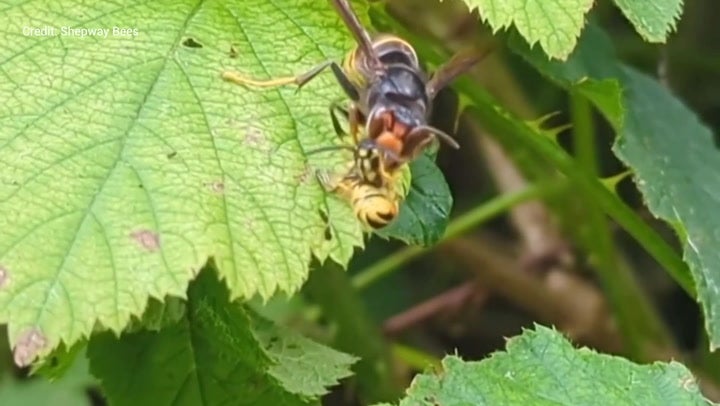Fears for the future of bees as Asia hornets attack UK
There have been more confirmed sightings of the Asian hornet in 2023 than the last six years combined

Your support helps us to tell the story
From reproductive rights to climate change to Big Tech, The Independent is on the ground when the story is developing. Whether it's investigating the financials of Elon Musk's pro-Trump PAC or producing our latest documentary, 'The A Word', which shines a light on the American women fighting for reproductive rights, we know how important it is to parse out the facts from the messaging.
At such a critical moment in US history, we need reporters on the ground. Your donation allows us to keep sending journalists to speak to both sides of the story.
The Independent is trusted by Americans across the entire political spectrum. And unlike many other quality news outlets, we choose not to lock Americans out of our reporting and analysis with paywalls. We believe quality journalism should be available to everyone, paid for by those who can afford it.
Your support makes all the difference.An invasion of Asian hornet bees in mainland Europe has raised fears of catastrophic consequences for the future of the UK’s bee populations.
Record sightings of Asian hornets have been reported in Europe, and nests have been found in East Sussex, Kent, Devon and Dorset.
There are now fears that the species could gain a permanent foothold in the UK.
The insects feed on native bees and wasps, damaging biodiversity.
The warning comes as leading scientists found that alien invaders play a role in 60% of animal and plant extinctions.
Alien species are living things transported around the world by humans into places they wouldn’t naturally be, and are one of the five drivers of biodiversity loss.
A report found that the cost of alien species to the economy has risen to more than £300bn ($380bn) a year across the world.
Kent-based bee keeper Simon Spratley told the BBC Asian hornets have caused 10 of 17 of his hives to be lost in quick succession.
“These insects are going to settle here and they’re going to predate on all insects especially the honey bee - that’s their natural food source,” he warns.
“They’ll end up destroying or over complicating bee keeping for everybody and reducing the [bio] diversity in the Kent area and the whole wider England.”
The Department for the Environment says Asian hornet poses no greater risk to human health than other wasps or hornets but can cause damage to honey bee colonies and other beneficial insects.
The public is being urged to be extra vigilant and to report any sightings immediately and to take care not to approach or disturb a nest.
“By ensuring we are alerted to possible sightings as early as possible, we can take swift and effective action to stamp out the threat posed by Asian hornets,” said chief plant and bee health officer Nicola Spence.
There have been more confirmed sightings of the Asian hornet in 2023 than the last six years combined, with 22 confirmed sightings so far in 2023.
There were four confirmed sightings of Asian hornets between 2022 and 2021, and only one in 2020.
Asian hornets are native to Southeast Asia but can be transported around the world in cargo. They are widespread in mainland Europe and can be blown across the Channel.
The species feed on honeybees and are said to be able to hunt down and eat 30 to 50 honeybees a day, according to The British Beekeepers Association.
The hornet typically has yellow legs and a dark body with a signature yellow band on its fourth segment.



Join our commenting forum
Join thought-provoking conversations, follow other Independent readers and see their replies
Comments